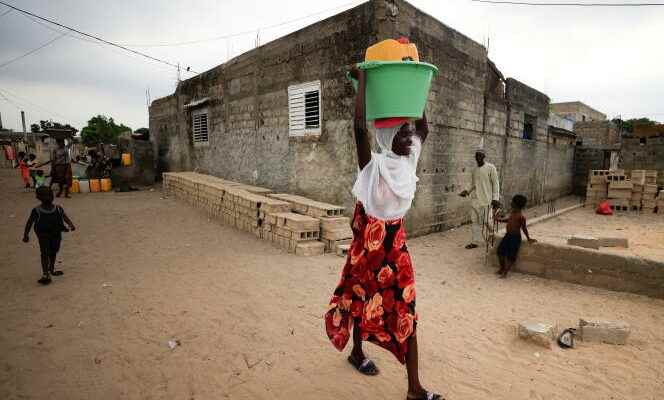To not miss any African news, subscribe to the newsletter of the “World Africa” from this link. Every Saturday at 6 a.m., find a week of news and debates covered by the editorial staff of the “World Africa”.
Six months pregnant, Diatou Faye, 27, came alone for her monthly consultation at the health center in Yeumbeul, a remote suburb of Dakar. A few weeks earlier, the young woman was chased out of her home by her husband, who suspected her of adultery and did not want to recognize the child or contribute to the pregnancy costs. “I had to sleep outside, near the gas station”, she says, still marked by this episode. There, she was spotted by Maty Sall, a “bajenu gox” (“neighbourhood godmother”, in Wolof) who quickly took her to the health center so that she could see a gynecologist. She was even accommodated by the maternity while the community actors found an agreement with her family, allowing her to go and live with her aunt.
“We covered all the medical costs. We reserve 3% of our revenue to emergency situations », explains Malamine Diop, social worker in this establishment opened in 2018 and which puts the eradication of gender-based violence at the heart of its concerns. In Senegal, 27% of women aged 15 to 49 have experienced physical violence, according to the National Agency for Statistics and Demography (ANSD, 2019). In more than half of the cases, the husband or partner is the author of these acts.
At the maternity ward of the Yeumbeul health center, where young mothers crowd with their infants hanging from their backs, a room is devoted to listening to women who are victims of violence. A work that health personnel now carry out hand in hand with community actors such as “bajenu gox”, imams or youth groups. “They live with the populations, who trust them, and can thus identify cases that are often inaccessible to us.explains Malamine Diop. If they already knew about physical violence, we had to make them aware of recognizing psychological, moral, economic or marital violence. »
Support lawyers
In Yeumbeul, a poor suburb where many inhabitants live in promiscuity, the most frequent abuses are so-called economic violence. “If the husband does not feed his wife, does not take care of her health or her daily expenses, I negotiate with him first to avoid going to court”explains Maimouna Diallo, “bajenu gox” since 2009.
In a country that is 95% Muslim, the challenge is also to involve imams in awareness-raising work. “We recall the duties of each in a marriage: the man must not mistreat the woman, he must take care of her, take care of her”details El Hadj Sakho, vice-president of the association of imams of the commune of Yeumbeul Nord.
In case of physical violence or rape, most community actors recognize that mediation is not enough. Maty Sall remains marked by the case of two teenage girls aged 15 and 16, both raped by their father a few weeks earlier. “We received them in the listening room, then we took them to the police after seeing the gynecologist, who gave a medical certificate”explains the neighborhood godmother, who turned to the Association of Senegalese Jurists (AJS) to find a lawyer and help them in their legal proceedings.
“Except when it comes to economic violence, we refuse any negotiation”
In the small offices of the “law shop” in Pikine, a neighboring suburb, four lawyers are busy drafting complaints, requests or legal conclusions. “If we have a case of violence that needs medical follow-up, we send it to the health center in Yeumbeul. Conversely, they refer us to people who need legal follow-up”explains Ndeye Bakhoum, coordinator of the place, one of the eight structures of this type that account the AJS in Senegal.
In Pikine, the team of ten lawyers handled approximately 1,600 cases free of charge per year in 2020 and 2021. Among these cases come first physical violence (38%) then sexual (26%), psychological (22%) and economic (13%). “Apart from when it comes to economic violence, we refuse any negotiation and support women in filing a complaint or asking for a divorce”, says Ndeye Bakhoum, who also sometimes has to explain to community actors where the limits of mediation are.
A painstaking job
For all the actors involved, this mobilization often resembles painstaking work. Thus, despite the confidence they have gained in their neighborhood, “bajenu gox” still struggle to get women to talk, who are not always aware of being victims of violence or rape, especially within the framework of a married couple. “Women have rights and should not submit sexually. There are limits. When they are not accepted by the husband, this is where the violence begins”observes Maty Sall, who knows perfectly well that many cases of abuse do not come out of the intimacy of the bedrooms.
From her office in the health center, Malamine Diop also sees women coming to denounce a rape before disappearing into the wild for fear that it will get out. “Violence and rape exist in shambles in our neighborhoods, but too often everyone is silent when the perpetrators must be denounced”says Maïmouna Diallo.
More and more youth associations are also getting involved. “Girls need to understand that they can report their abusers without shame, and married women need to realize that marital rape exists”insists Michel Gomis, 27, one of the leaders of the Yeumbeul teenagers’ club, who does not hesitate to intervene in schools and high schools on these still taboo subjects.
Summary of the series “In Africa, women facing violence”
